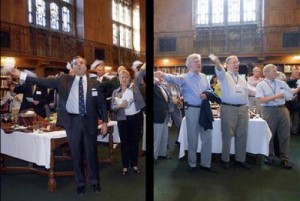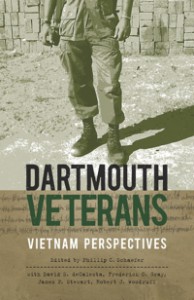Fifty year anniversaries offer special opportunities for public reflection. For those old enough to remember, there is always the chance for gaining perspective over past experience and its consequences. For younger people, there is the opportunity to learn about the ways the past has helped shape contemporary life.
2014 has supported a particularly robust series of retrospective anniversary observations, starting with PBS’s American Experience’s program on 1964, followed by an ongoing series on the year at NPR, including the Civil Rights Act of 1964. Freedom Summer 1964 was celebrated this past weekend at the annual meeting of the Organization of American Historians. Once can only wonder what will be done to mark passage of the Tonkin Gulf Resolution August 10, 1964 or the Free Speech Movement that convulsed the Berkeley campus during the fall of that year.
 Soon the graduates of 1964 will be celebrating at reunions the fifty years that have marked the period since they left college. Such occasions have often been the subject of humor. Gary Trudeau’s Doonesbury immediately comes to mind. But such occasions inevitably lead to serious reflection as well, and that is reflected in projects being undertaken at a number of universities.
Soon the graduates of 1964 will be celebrating at reunions the fifty years that have marked the period since they left college. Such occasions have often been the subject of humor. Gary Trudeau’s Doonesbury immediately comes to mind. But such occasions inevitably lead to serious reflection as well, and that is reflected in projects being undertaken at a number of universities.
At Amherst, the Class of 1964 has titled its reunion, “The World We Inherited and the World We Will Bequeath.” In an effort not just to remember the past, reunion organizers have invited classmates and their spouses to join a problem solving team “to provide a forum for engaging with class members (and their family members) prior to, during and, perhaps, following the reunion.” Among the problems identified has been climate change, which strikingly enough has generated skeptics as well as true believers that the world faces an imminent environmental crisis.
Recognizing the centrality of the Vietnam War to their lives, Dartmouth ’64 has compiled a volume of  memories from those who served in the military. Like those in other elite colleges who graduated before the war heated up, a significant proportion of these men joined the military, never imagining they would find themselves entering, defending, and criticizing a war that quickly divided the nation.
memories from those who served in the military. Like those in other elite colleges who graduated before the war heated up, a significant proportion of these men joined the military, never imagining they would find themselves entering, defending, and criticizing a war that quickly divided the nation.
Yale ’64 also intends to interrogate the past. We’ll open with a panel I will chair entitled “The Legacy of Our Sixties.” Participating will be Steve Bingham, a veteran of Freedom Summer and subsequent civil rights actions; Gus Speth, a leading figure in raising awareness about climate change; Tom Powers, a longtime commentator on national security; and Nick Danforth, who played a key role in advancing Roe v. Wade to consideration before the Supreme Court. To assure debate among these men, former Washington Post managing editor Bob Kaiser will chair a panel composed of former U.S. Senators Ashcroft and Lieberman under the provocative title, “Did We Blow Our Chance?”
No planned problem solving appears in the program for the Yale reunion, but it is worth noting that Bob Musil, a veteran who was honorably discharged from the Army as a conscientious objector and who has subsequently written about the environmental crisis urges his classmates in his 50th reunion book to form an action network. Such a force, he imagines might appear together “at the White House and Congress, on campuses, at churches, in shareholder meetings, to demand an end to fossil fuels, rampaging gun violence, economic insecurity, a world at war. Imagine when our grandchildren speak of legacies, when they whisper in awe the name of Yale’64, the class that started the tradition of alumni social action. That would be a legacy.”
Whatever comes of the debates and the resolutions at these class reunions, the past is bound to be investigated for what it tells us about contemporary life. I intend to follow this process in the coming months as a run-up to my own assessment of what the collective experience of this particular generational cohort reveals about the 1960s and its aftermath.
As one of those speaking on the “Legacy of the 60s” panel you organized, I second Bob Musil’s call for Alumni social action, starting with inspiring current Yale students to commit to working for a better world. While attending my daughter’s Yale graduation in 2009, famed economist and Yale President Richard Levin extolled the virtues of capitalism, then undergoing serious free fall. Not a word to that crop of Yale graduates going forth into the world that they should be ethical in whatever they do. Yale grads were almost certainly among those concocting investment instruments that almost brought down the whole house of cards. Did Yale fail to inculcate ethical values in them? We as alum can lend a hand to do so.